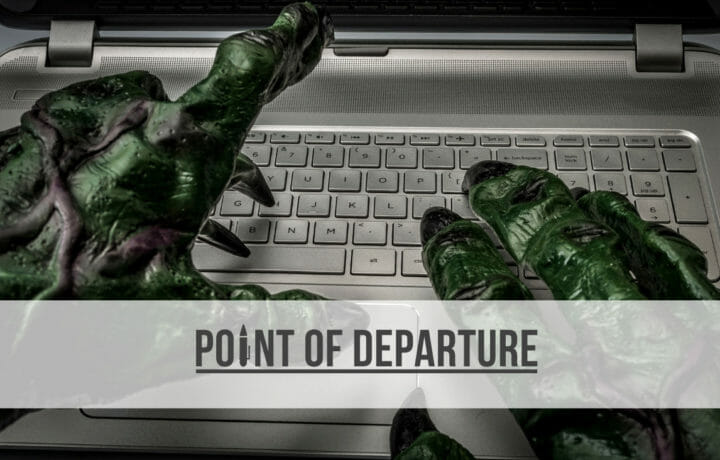If you pay much attention to military affairs, it was kind of hard to miss. Last week, during a monologue segment, Fox News host Tucker Carlson came at the Defense Department with both barrels smoking: “So we’ve got new hairstyles and maternity flight suits. Pregnant women are going to fight our wars. It’s a mockery of the U.S. military. While China’s military becomes more masculine as it’s assembled the world’s largest navy, our military needs to become, as Joe Biden says, more feminine—whatever feminine means anymore since men and women no longer exist. The bottom line is it’s out of control and the Pentagon is going along with it. Again, this is a mockery of the U.S. military and its core mission, which is winning wars.”
The response was immediate. Military leaders, veterans groups, and a variety of others—veterans, servicemembers, and national security professionals—quickly rose in defense of those subjected to Carlson’s misogynistic rant. Secretary of Defense Lloyd Austin responded that the comments inspired “revulsion.” Sergeant Major of the Army Michael Grinston elaborated that Carlson’s “words are divisive, don’t reflect our values.” Pentagon Spokesman John Kirby added a final thought: “What we absolutely won’t do is take personnel advice from a talk show host or the Chinese military. Now maybe those folks feel like they have something to prove; that’s on them.” Carlson offered a classically weak response, complaining on Twitter that his show was being attacked “like we’re a foreign power.”
If it had ended there, it would have been remembered as probably the most solid tag team takedown since the Mega Powers made their debut at Wrestemania IV (look, it’s pretty hard to top Hulk Hogan and Randy Savage). But it didn’t. Before the weekend had started, the Twitter lawyers—not the real ones, but the ones who have never missed an episode of Law & Order—were out in force, erroneously citing everything from the Hatch Act to the First Amendment. Then came the public affairs experts—again, not the real ones, but the ones who once met a journalist during a deployment—to add perspective on the limits of public affairs authority with a member of the fourth estate. And, finally, the trolls. These were the real ones, who smell a controversy and want only to stoke the burning barrel of excrement that social media often devolves into. Along the way, there were some useful additions to the discourse, but a lot more that did nothing but add diesel to the fire. And, by this morning, some were busy trying to walk back their comments, while others were still knee deep in the quagmire.
We’ve seen this before. We’ll see it again. In a world where everything is high drama, the victor in the future is likely to be the one who avoids as many skirmishes as he fights – especially when your general already fired the parting volley. Avoiding the embarrassment, derision, or career consequences isn’t difficult, but some basic principles come into play.
5 Ways to respond to criticism without Screwing the Social Media Pooch
Know the rules.
Every citizen has the right to criticize the military. That doesn’t mean they know what they’re talking about, nor does it obligate you to respond. Kirby’s response acknowledged the rules of the game, but he was also careful not to recognize Carlson, his show, or network. As a result, his response did not give agency to the commenter or his comments. In the world of public affairs, this is the ultimate pro move.
Think strategically.
Strategic thinking rarely comes into play in social media. If it did, we might avoid some of the blowback we too often see. Before weighing into an argument, view your thoughts—and potential comments—through a long-term lens. Is it worth commenting? Are you prepared for a lengthy engagement? Will your comments make a difference? Are there any personal or professional ramifications?
Stick to the facts.
Assuming for a moment that social media is a rational space—which is a pretty wild assumption—any logical case needs to be built based on facts. Whatever you do, don’t burn your argument down while you’re trying to build it. Save your passion until you’ve made your case, then bring it home with some fire.
Stay above the fray.
To paraphrase our former Defense Secretary, “Be polite, be professional, but have a plan to slay it.” What you don’t want to do is get dragged into the mudslinging. Austin, Grinston, and Kirby kept themselves above the fray with their responses, in which they were consummate professionals. They made their points succinctly and directly and remained clear of the fray.
Don’t feed the trolls.
At the risk of repeating myself, the more divided we become as a society, the easier it is to find yourself dragged into a debate with someone who pushes your buttons. Don’t. Arguing with a troll on social media is like wrestling a pig; you end up covered in mud and the pig likes it. Step away from the keyboard and give yourself time to process what’s happening before responding.
There was never much a of question about whether Carlson was wrong. He makes comments such as these to stir controversy and to draw attention to his brand. In responding, you have to decide whether you want to draw added attention to that brand and, if so, how much. Because the longer the Twitter outrage storms, the more attention it gains, and the more people are drawn to what you’re trying to diminish.
In the end, Kirby’s pro move was apropos. Rise to the defense of those insulted, but do so in a way that doesn’t add exposure to your negative detractor. That’s a move even the Mega Powers would have respected.




